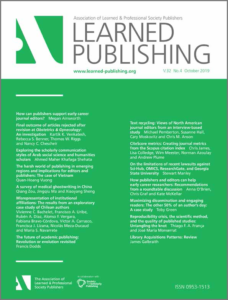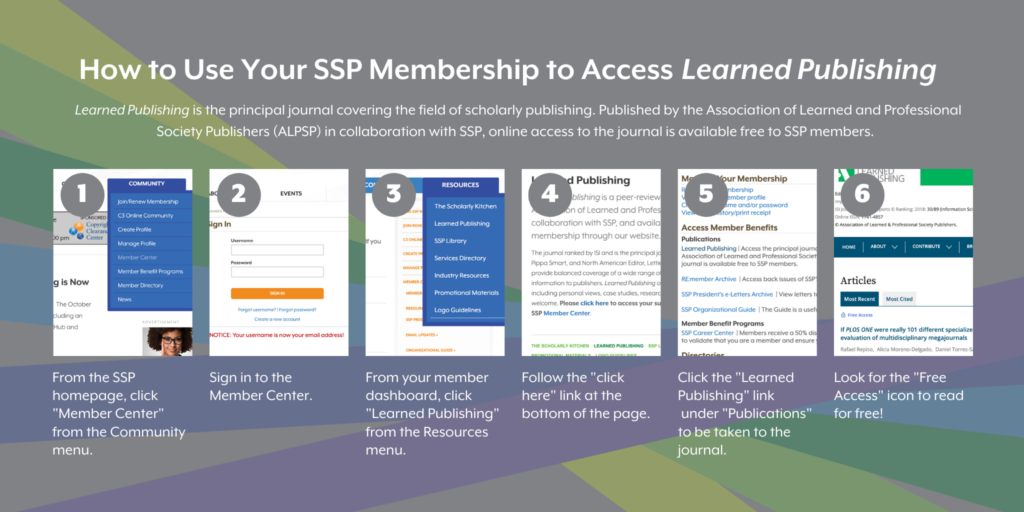We would like to alert members of SSP that the April 2024 Special Issue has just been released!
Learned Publishing (April 2024)
Perhaps the biggest announcement for Learned Publishing is the move it will be making to become an open-access journal in 2025. The official press release is on the ALPSP website and also at Knowledge Speak. This will be a big change for the journal, with implications for the SSP community. APCs will be covered by ALPSP for its members. Any SSP member who also maintains membership with ALPSP will have funding supplied by ALPSP to cover the cost of publishing in Learned Publishing. SSP members will need to seek funding for publishing in Learned Publishing. If you have questions or concerns about this transition, please do not hesitate to contact Michelle Urberg, North American Editor for Learned Publishing.
Please look for the call for Special Issue submissions soon! The editorial board of Learned Publishing just met and discussed possible themes for the next special issue. The board also agreed to change the publishing timeline for the special issue beginning in 2025. The call for submissions will be earlier than in previous years, and the publication plans to be moved to the second issue of the year for a March release rather than January. This will ease the editing and production burden over the holiday break from mid-December to mid-January.
And, finally, the April issue of Learned Publishing has a nice variety of material for your reading pleasure (issue summary adapted from the Editor-in-Chief’s summary)
In the spirit of the open access announcement, I highlight here the open access articles, case studies, and opinion pieces in this issue. That being said, SSP members can always access paywalled content at the SSP member center.
One original article was published in this issue:
- Alexander Burrell, et al. explore how Altmetric scores influence primary care research and have found that not all specialties benefit equally from citation scores.
Three open access case studies were published in this issue:
- Heinz Pampel et al. describe the ORCID DE project; an initiative to promote author identification in Germany.
- Many publishers are considering and implementing methods to scale up Open Access publishing. In their case study, Ciaran Hoogendoorn and Gaynor Redvers-Mutton describe the Biochemical Society’s transformative Read & Publish (R&P) agreements, focusing on results from 2019 to 2022.
- Research integrity continues to be an important topic for Learned Publishing, and in their case study, John Willinsky and Daniel Pimentel describe the development and implementation of a ‘publication facts label’ (PFL) to provide readers with information about the integrity and trustworthiness of research articles. The PFL aims to improve transparency by presenting key information about a research article in a standardized format that readers can easily access and understand.
One industry update was published open access in this issue:
- A group from Wiley Partner Solutions, Robin Dunford et al., assesses research integrity in scholarly publications. They note that these efforts often focus on the front matter and the article body, but as they point out, the bibliography can also hold clues to publishing fraud. The authors describe the use of automated bibliography analysis to detect potential research integrity issues in scholarly publications.
Happy reading!
 Michelle Urberg
Michelle Urberg
North American Editor
Learned Publishing
NOTE: All articles are free to SSP members and journal subscribers; those editorials, reviews, and articles using the ‘ALPSP Author Choice’ OA option are now free to all. Also, be sure to sign up to receive an email or RSS alert every time a new issue goes online.
SSP members – please log in to the member center on the SSP website to access the full content.




Join the Conversation
You must be logged in to post a comment.